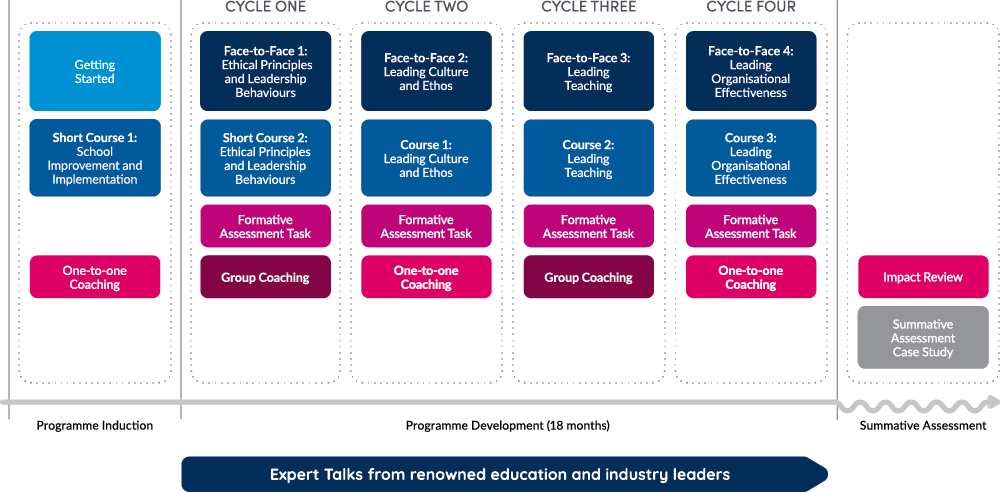Which NPQSL pathway is right for me?
📱 On mobile? Swipe sideways to see the full table →
What is the NPQ for Senior Leadership (NPQSL)?
The NPQSL is a DfE-accredited qualification.
The NPQSL equips participants with the knowledge and expertise needed to become a senior leader.
Although the role varies, many senior leaders contribute to all aspects of the school through the leadership team as well as having a specific whole school responsibility of their own.
This means the role is often both operational and strategic and relies on working with and through colleagues (in particular, through middle leaders) to ensure every pupil gets an excellent education.
What will you learn on the NPQ for Senior Leadership (NPQSL)?
The NPQSL is designed to equip teachers with the essential skills, knowledge, and confidence needed tackle school improvement priorities, create a positive and safe environment for students, contribute to the school's strategic direction and support staff. There are four cycles and an introduction cycle, focusing on:
- School Improvement and Implementation
- Ethical Principles and Leadership Behaviours
- Leading Culture and Ethos
- Leading Teaching
- Leading Organisational Effectiveness
Who should apply for the NPQ for Senior Leadership (NPQSL)?
The NPQSL is suitable for school leaders who are, or are aspiring to be, a senior leader with cross-school responsibilities.
If you have leadership aspirations or experience and have been teaching for at least 2 years, we encourage you to apply.
How is the NPQSL delivered?
The NPQSL is delivered through a mixture of Face-to-Face events, online study, webinars and coaching.

- Induction Cycle: School Improvement and Implementation
- Cycle One: Ethical Principles and Leadership Behaviours
- Cycle Two: Leading Culture and Ethos
- Cycle Three: Leading Teaching
- Cycle Four: Leading Organisational Effectiveness
- Each cycle includes a mixture of coaching, online study activities and webinars
- 4 all-day Face-to-Face events facilitated by experienced school leaders and facilitators
- Leadership performance coaching
What are the benefits of completing the NPQ for Senior Leadership (NPQSL)?
The fully blended learning approach combined with performance coaching and enrichment activities make this an exciting and valuable opportunity for those who are ready for senior leadership.
Benefits for participants
Choose what to study
Our regular needs analysis support participants to focus their energies on those aspects of their leadership they most wish to develop.
Online learning environment
Access online learning and support via our virtual learning environment Canvas. Through Canvas, participants are able to engage with their learning communities of peers and access multimedia content.
Personalised feedback and coaching
Receive high-quality feedback and continuous support from a Leadership Performance Coach, Face-to-Face day facilitators and coaches.
Benefits for schools
Upskill your staff
Your school will have a leader with the skills necessary to successfully implement sustainable changes intended to secure improved pupil outcomes.
Informed school leader
A professionally aware and informed leader who can recognise the importance of having a secure evidence-base to underpin their strategic decision-taking and is familiar with the science of learning.
Future focused leadership team
Support the succession of school leaders and build a cohesive, impact-focused school leadership team.
Why choose the NPQSL with Best Practice Network?
- Coaching: Receive personalised coaching sessions tailored to your specific needs and goals
- Local delivery: Our nationwide delivery partnership network allows us to bring Face-to-Face training to a school near you, facilitated by local school leaders
- Ongoing support and feedback: Personalised feedback on your tasks and support to pass your final assessment
- Proven excellence: Choose an Ofsted rated 'outstanding' provider with over 20 years of experience delivering teacher training
.png)
Applicants must have full support from their school/organisation. A head teacher, member of the SLT, line manager or Chair of Governors (or similar authoritative role) must confirm their support and that all information submitted is true and correct. This is a Department for Education mandatory requirement.
To apply for NPQSL, applicants must have the following:
- Teacher Reference Number - see TRN Support Guide
- 2 years teaching experience
- Leadership aspiration/experience
If you are unsure if you meet the above requirements or have other relevant experience then please contact our team who will be able to support your application.
The National Professional Qualification for Senior Leadership (NPQSL) costs £1,145 plus VAT if applicable.
- Candidates from international schools should visit our NPQSL international page for international prices
The leadership performance coach is a participant’s main point of contact for the duration of the NPQSL. Our leadership performance coaches are experienced teachers and leaders who are experts in our programme curriculum. They understand first-hand the challenges teachers experience in work life. Their role is to support a participant's progress and development through the programme. They support you by:
- Providing advice and feedback throughout the programme
- Marking and responding to all of your practice task activities completed for each online course
- Providing you with feedback on each of the Formative Assessment Tasks following their completion
Our leadership performance coaches apply flexibility and are accountable to ensure success on your programme. With the above responsibilities, their main role and purpose is to help you manage your workload and ensure work life balance as much as possible whilst studying with us.
At the end of the programme, in conjunction with their mentor and in-school performance coach, participants will evaluate the impact of the programme on their leadership development and the benefits to their school.
The NPQ frameworks are based on a robust method of design and development, building on the evidence base and expert guidance already established in the ECF and the ITT Core Content Framework. The NPQ frameworks reflect the Teachers’ Standards and Headteachers' Standards to ensure coherency with the requirements already used by the teaching profession.
Please see the NPQSL Framework below. If your computer or device does not support the Adobe plugin you can download the framework pdf here.
Related Courses and Content


.jpg)